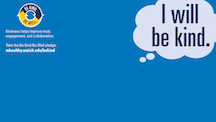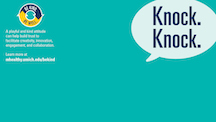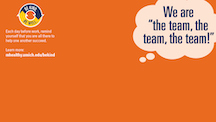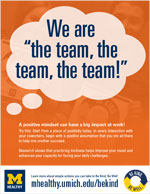Kindness, gratitude, and compassion make a positive difference in the workplace. And bringing these practices into your daily interactions can help make a more caring community.
It can help build collaboration, compassion, and recognition in your colleagues. And a great place to start is being kind to yourself.
Research shows that kindness helps improve your mood and enhances your capacity for facing your daily challenges. Kindness and gratitude can also build trust and strengthen your work team to facilitate creativity, innovation, engagement, and collaboration.
Resources to Share Kindness
These Be Kind Be Well (BKBW) digital downloads make it easy to share messages of kindness in the workplace. You can help weave kindness into your workday with these Zoom backgrounds and mobile phone wallpapers. And the Gratitude Email Generator is a fun way to recognize a colleague and send some words of thanks.
Zoom Backgrounds
Download your favorite BKBW graphic to add some kindness to your next virtual meeting.
- Click on a thumbnail to open the full-sized image
- Right-click (control + click for a Mac) on the full-sized image
- Save the file to your computer or device to use as a virtual background (see ITS instructions for Zoom backgrounds)
Mobile Wallpapers
Download the image (on your phone, press and hold the image and select "save to photos") and set it for your phone's lock screen, home screen, or both!
Gratitude Email Generator
This is a simple form for you to share kind messages of gratitude to anyone via email.
Take the Pledge
The Be Kind Be Well pledge is a downloadable PDF that you can print. Try posting someplace where you'll see it often. It can be a good reminder to choose kindness and gratitude throughout your day.
Put Your Pledge in Your Email
If you took the pledge, let people know - email-style! Download this image for your kindness email signature.
- Right-click (control + click for a Mac) on the link or thumbnail
- Save the file to your computer or device to add it to your signature. (See "Set up email signatures" on this Google Learning Center page).
Also, check out the other resources, research, and other information in the blue panels on this page. They are intended to help incorporate gratitude into your day-to-day work.
If you or someone you know needs more support, we're here for you.
Looking for counseling and consultation services? Confidential, one-on-one short-term counseling with a professional mental health counselor is available to all university faculty, staff, retirees, and their families at no charge.










